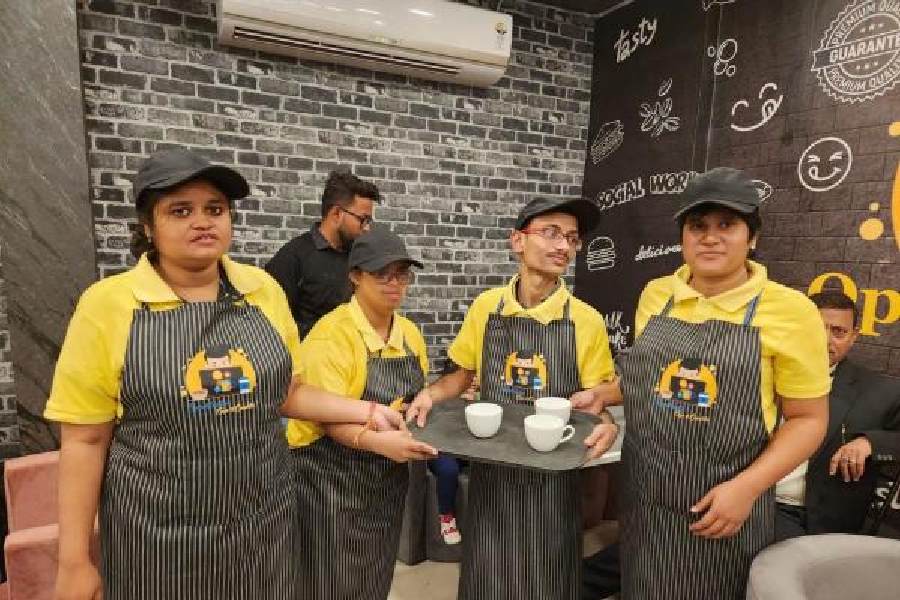Many a block invites specially-abled persons and treats them during Durga puja. But some of those invitees would rather treat the residents of blocks round the year at a cafe where they cook and serve.
Here are three reasons to visit Opportunity Cafe & Co-Works, a swanky new joint at Dum Dum Road, close to Lake Town. It serves tasty grub, has Instagram-worthy interiors but above all, it has a very special staff.
“We run a home for girls who have been rescued from trafficking. We have also adopted a home for boys, run by another NGO. But we cannot keep the inmates after they turn 18 and they often have nowhere to go. This cafe is a means to employ them gainfully so they can be independent. We also decided to rope in differently-abled youths, another group that lacks employment opportunities,” says Sidhant Ghosh, founder and secretary of the NGO Rescue & Relief Foundation.
The cafe is a safe space for the youths in a world that is out to be cruel to them.
“My son could have completed his Madhyamik but had to drop out because of incessant ragging by classmates and even teachers who would call him mad. How could I force him to return to school after that,” asks Goutam Saha, whose autistic son Bhargav Priya Saha now smilingly serves tables.
“Even in some special schools, they humiliate students by twisting their ears or kicking them out of classes if they fail to follow lessons. But now, my son threatens to report me to his special trainer Mangal sir if I so much as scold him,” says the father.
Ask waitress Sonia Chatterjee what she would like to serve you and she says “biryani”. When reminded that their cafe does not serve Mughlai, the autistic girl laughs innocently and says: “sandwich”.
“These youths are invited to felicitations, treated to meals, and then forgotten. What use is the felicitation to them? My daughter does not need anyone’s pity,” asserts Sonia’s mother Susmita Chatterjee. “She has her capabilities and needs job opportunities that match her skills. I won’t be depending on my daughter’s income but with this job, she can earn society’s respect.”
They also have trafficked girls who are now baking pizzas and cakes, trying to forget their past and look into the future.
“We have brought in youths who are weak in academics as the others will find something or the other. But with special children, even their parents get frustrated and beat them, give up on them, and isolate them,” says Ghosh, a lawyer, adding that many parents from needy backgrounds abandon their special children. “And then they land up at our homes.”
No tips, please
The cafe is a non-profit one and there is a co-working area overhead to cross-subsidise it till it stabilises. And customers are requested not to tip the waiters. “The staff is paid well enough; they don’t need pity,” assures Ghosh.
Papiya Mukherjee says her autistic daughter Aritri Mukherjee does not even understand the concept of money. “Offer her money and chocolate and she’ll take the latter. There are several vocational training centres for special students but employment generation is more important,” she says.
When Gayatri Bhattacharjee learnt that this cafe wanted to hire her daughter Nupur, she wept with joy. “Nupur has Down Syndrome and we worry about what will happen to her after we are gone . But she’s working now and is happy and I am so proud of her,” Gayatri smiles.
Power of love
The youths’ conditions make them slow learners but Ghosh said they have improved more in their six months of training than in years that they have spent at special schools.
“It’s because they are getting to interact with ‘normal’ people,” he says. “Elsewhere they fail as they are assured they are incompetent. If a normal child falls, his parents tell him to get up; but these youths have grown up being told that they can’t do anything. They may be slow but they understand discrimination and respond to love,” he says.
He talks of Ramu, an autistic deaf-mute boy, who was either lost or abandoned by his family. “One day Ramu saw Bhargav struggling to open a door with a tray in hand. Given Ramu’s condition, he is not supposed to empathise but he walked up and helped his friend. Another youth, Bapi (who has mental retardation and was also lost) has separation anxiety so Ramu started hand-feeding him,” Ghosh says.
Sometimes the youths have bad days, but then who doesn’t? The cafe gives them off on such days and there are special educators present around the clock to help out. “Other eateries sack special employees for dropping plates and their colleagues bully them as the bosses go soft on them,” says Ghosh. This cafe is a model to show other eateries that they are capable of a lot more than we give them credit for.”
